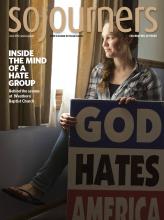Each Sunday, in many churches across North America, congregants hear these words preparing them for communion: “The Lord Jesus, on the night when he was betrayed, took a loaf of bread ...”
However, few churchgoers kneeling for bread and wine at the altar may know that these words in 1 Corinthians 11:23-26 are set in a longer section (11:17-34) that begins sharply: “Now in the following instructions, I do not commend you, because when you come together, it is not for the better, but for the worse!” Paul continues the attack in verse 20: “When you come together it is not really to eat the Lord’s supper. For when the time comes to eat, each of you goes ahead with your own supper, and one goes hungry, and another becomes drunk” (emphasis added).
What Paul describes sounds more like a food fight in a high school cafeteria than our solemn rituals. Have we missed something in this text?
This article isn’t mainly about food. It’s about inequality—the 99 percent versus the 1 percent. But when you live in the Roman Empire where most inhabitants live at or below subsistence, earning enough daily bread is the main thing you think about.
A longtime friend, George McClain, and I are presently finishing a curriculum simulating a house church planted by Paul in Corinth during the years 50 to 51 C.E. We owe much to the research of biblical and classical scholars and archeologists on power relations in the Roman Empire. This “empire-critical” method examines the sociological, political, religious, and economic structures that underpin first century Rome. Such structures contrast starkly with the “kingdom of God” as proclaimed by Jesus and his apostle Paul.
Read the Full Article
